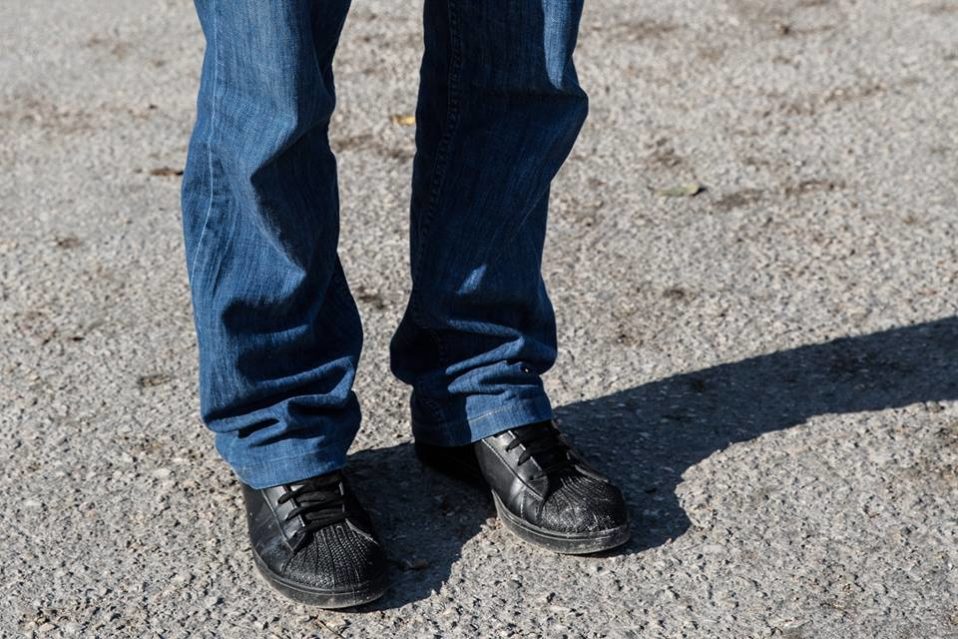In order to give people outside Chios the possibility to understand how it is to be in a refugee camp on the island, A Drop in the Ocean will present an alternative Christmas calendar this year. Each day until Christmas, we will post 24 amazing stories about the people we are so blessed to spend our everyday with.
December 13th: Hussame
Written by Kristin Sørsdal and photos by Nickie Mariager-Lam
A Violation of the Geneva Conventions
Standing in the dust, or sitting on the battered steel benches or walking up and down the rows of UNHCR-logoed tents, or standing in a queue – a queue for food, a queue for shoes, a queue for a jacket, a queue for an interview, a queue for the toilet, a queue for the shower, a queue for the doctor, a queue for a new blanket – was not the way Hussame, a University lecturer from Syria, had planned to live his life once he managed to escape the war and reach Europe.
Hussame is in his late forties and speaks perfect English. He has a Master in English Literature and has taught students for many years at home. I met him a few days ago because I was eager to learn Arabic and he seemed like the perfect teacher. However he probably considered my Arabic so limited that he preferred to discuss politics. He told me that other volunteers from Drop in the Ocean had asked him to tell his story and he had always declined. I therefore asked him if he could tell me why and what he feels is the most important issue we should be talking about right now.
“Yes”, he said, “but then you have to call me Hussame, not my real name, and you need to write better English than you speak Arabic”.
He said it with a smile in his eyes, and I said I would do my best.
We are standing next to the white Médecins du Monde van that just came into Souda Camp. Children in their open sandals are running around us, playing with a ball or, begging volunteers to give them piggybacks. They don’t have a kindergarten to go to and probably barely remember what a normal school day is like.
Hussame wants me to take a good look at the conditions people like him are forced to live in.
“Refugee literature, maybe it will become a new genre for European readers. Of course it is important, but right now recording our experiences is not the main issue. My story is not important. What is important is this:
Europe has signed the Geneva Conventions and Protocols. Europe calls itself a democratic continent, which respects human rights. Every country in Europe has signed the 1951 Refugee Convention. Why?”
He looks at me with questioning eyes:
“Why sign all these agreements when they are not respected?
Why say you respect human rights when it is clear that you are violating them?
Europe lets us live here, trapped on an island, leaving us no other option than to wait, wait, wait. As if we are not real human beings. And do you know how this makes me feel? I feel like a burden. Every morning I stand in a line to be given food, every afternoon, every evening. I am a teacher. I have had a long working life as a university lecturer. I want to use my skills. I want to do something. I don’t just want to be fed.
That was the biggest shock to me,” he says.
What? I ask.
“To become marooned here on this island”.
Marooned?
I look up at him from my notebook. I don’t understand the word he just said. He really looks like a gentle teacher, with a respectable, clean-shaven face, those calm, serious eyes, the short haircut and a neat grey winter jacket. He explains patiently:
“Like I am stranded on an island, far away from the civilized world.”
Ah.
“We thought we were going to the Europe we read about in books: A Europe with a long history of political thought, evolving from the medieval mentality into a place where the rational principles of brotherhood, equality and liberty were your guiding lights.”
And?
“And instead we are kept here like open-air prisoners. We are kept here because Greece does not want to let us go”.
Isn’t the problem a little bit more complex?
“Yes, of course it is, but much of this has to do with money. For each registered refugee the Greek authorities get money from the EU. This is a refugee business.”
I look at him again. I do not entirely agree, but I let him continue.
“What I do know, he says, is that life here, for all of us, both the young men who started the fight yesterday, whether they are from Palestine, Afghanistan, Algeria or some other place, and for the families – the mothers, fathers, children – is a fate worse than death”.
And he adds:
“For me it is as if I escaped from death, only to meet death. As if I escaped from the frying pan and fell into the fire.”
He looks around and points at the people sitting on benches or standing in groups, waiting for the refugee bus – the bus with the dirty windows that ferries people between Chios’ two refugee camps – and says again that the most shocking thing is that all this is happening in Europe.



Post a comment